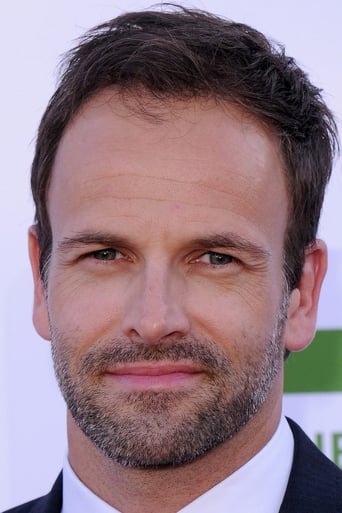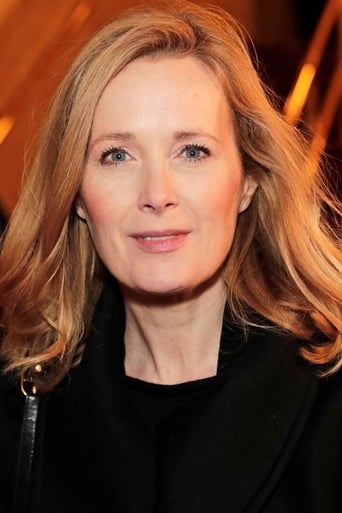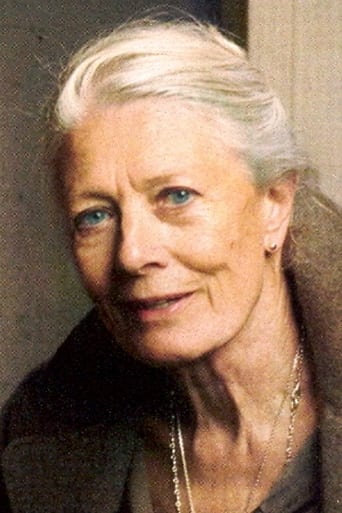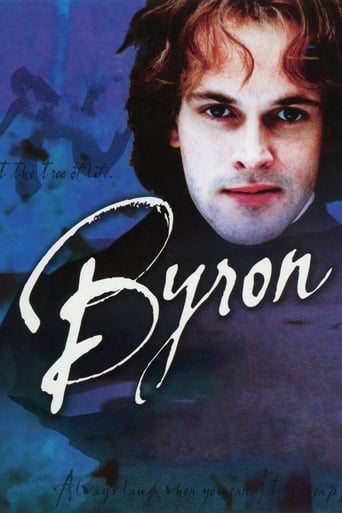
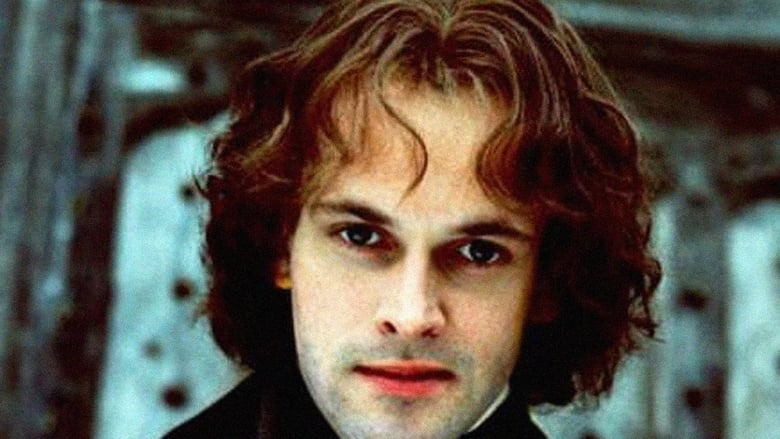
Byron (2003)
Life and adventures of lord George Gordon Byron. BBC dramatization of the poet's final thirteen years
Watch Trailer
Cast
Reviews
Simply A Masterpiece
I like movies that are aware of what they are selling... without [any] greater aspirations than to make people laugh and that's it.
Great movie! If you want to be entertained and have a few good laughs, see this movie. The music is also very good,
True to its essence, the characters remain on the same line and manage to entertain the viewer, each highlighting their own distinctive qualities or touches.
In the end how do you judge a man like George Gordon Byron? He certainly left a nice body of work to judge him as writer and poet. It might have been more had he spent a little more time at creation and less indulging every kind of vice there was. As he puts it so accurately pleasure is the only real reason we know we're alive.This film covers the period of 1812 to 1824 from the publication of Childe Harold's Pilgrimage until his death. He's quite the toast of Regency London and he's welcome by dint of his work and title in the best of homes. He soon wears out that welcome in a series of scandalous affairs. Regency society didn't mind affairs, but just be discreet. Discreet did not exist in his vocabulary.Byron's personal life is probably best known for his affair with Lady Caroline Lamb. But this film shows she's only one of many. Camilla Power plays her and Power is in the film long enough to show what a mad woman she was. A little too much for a lover and a husband to handle.I can't think of anything Byron missed. He made it with any woman who showed the slightest interest, even a little incest with a sister. He indulged himself in the love that dares not speak its name with a young boy. He drank to excess, took opiates at a rate that his contemporary Coleridge might have envied. There's brief scene of him turtling down some Laudanum like it was a brewski.I think he envied the Shelleys played here by Sally Hawkins and Oliver Dimsdale. Percy Bysshe Shelley and Mary Shelley were his contemporaries and they seemed to find happiness that was unattainable for Byron.Jonny Lee Miller plays the title role and makes Byron the last word in hedonism. He strikes just the right notes and pulls a lot of emotions from the viewer. You envy him and yet you're jealous of him. He's rich with a title which allows him to indulge. We'd all like to be him, but the business of day to day living leaves 95% of us with enough challenges for our lives.This BBC production of Byron is both revealing and non-judgmental. It will give you a good understanding of the man who in many ways was the symbol of the romantic age.
I am appalled by some of the reviews on this movie. The people who take the time to criticize the film because they find Byron's personality inherently distasteful are no better than the stuck-up, vapid, and inherently depressed figures that also made up the aristocratic regency of England. Hypersensitive people like Lady Caroline or Byron merely reflect the madness and desperation festering within all of us, as well as the absolute solipsism. For one reviewer to find it important to tell us the movie was lusterless because Byron was a chaotic and dissolute fiend is about as productive as setting a leaf on fire and hoping the forest will catch. For your information, Byron was and is a hero to those who would dream. Don't take the opportunity to offer your privileged and sheltered scornful opinion on a legacy and film that have no time for such worthless peons of petulancy such as yourself. Yes he did things in his life that are considered horrible, but now he, and those he hurt, are no more than flakes of dust and dirt blowing around this world. Take time to focus on your menial existence rather than pompously proselytizing about others.Now that I am done putting down the insufferable philistines who found it fit to comment, I'll offer my own opinion on this movie. I adore this movie, and I make a habit of watching it at least once a month if I can. Sure it's choice of making an apex of Byron's life in England is blatantly wrong, and I thank the person who wrote that wonderful review mentioning how that choice is only a mark of the continuously conservative and scandal-obsessed society we live in today, but the aesthetics of the film remain intact. In fact, this biopic is perhaps the best I have seen in regards to its respect for the viewer's basic intelligence, wit, and sense of aesthetic. We are given the life of a man hounded by his own existence bar none. My favorite scenes were the ones between Byron and Augusta, though I would have liked to have seen Shelley get a larger role and have Keats ridiculed by Byron as well (that middle-class masturbator, to paraphrase Byron).Please, if your mind is as sufficiently petty as benbrae76 (who wrote that god-awful review), don't bother commenting. Or even better, take a cue from Fanny Imlay (Mary Shelley's half-sister) and kill yourself.
OK OK, it might be hard to put the entirety of a man's life in one film. Traditionally therefore, biopics focus on one or two significant parts in the subject's life. Now, Byron was a "my week beats your year" fellow, which makes selecting parts that are representative even harder. Furthermore, just as Byron's poetry is inseparable from his life, the man's life itself must be seen as a whole. Lifting parts out is not only not showing the whole picture, it's showing a different picture altogether.Now, in short my review comes down to this: supposedly, Byron was indeed the "my week beats your year" prototype, a guy who lived so intensely that he indeed did more in his 15 or so active years than most do in an entire lifetime. True, he had setbacks and was a victim of the time and social setting he lived in - but in the end, this dude is supposed to be the prototype whose life we'd all want to lead, no? Well, I did NOT, at ANY moment, want to live the life depicted in this film. So it gets 3. Not for being so badly done (which, direction-wise, it more or less was), but more importantly for missing the point entirely in a flat plot.Some more detail. Well, to over simplify things, a Byron bio should have two distinct episodes: 1. Post-first Europe trip: England and his rise to fame + marriage / 2. His life abroad. Now, the important thing is that the SECOND part should be at least as important as the first. Not only was it a lot longer, but the most significant change in Byron took place then. Furthermore, it's where he created his best works (Don Juan, the Vision of Judgement etc. - all the stuff that makes him *really* unique in English literature).Instead, in this film (a) Byron's life never comes across as even remotely entertaining, (b) it only gets *worse* after he leaves England. They did two good jobs: first, they started at his return of his Europe trip (though a bit more of the actual trip would have been welcome as a prologue), second, they chose an angle, and they chose his incestuous love for Augusta (who is rather perfectly cast). The problem with this last thing is that they never let it go. True, Byron remained strongly attached to Augusta for the rest of his life, but, especially as he was such a mood swing person, the fact that his letters reflect that does not mean that at other times he might not have completely enjoyed life.Anyway, the first part of the TV film should have ended with him leaving England. There's no doubt about that. The thing is: once abroad, a life of debauchery began (with the infamous Geneva period), but in Italy Byron also discovered a new life, both for his poetry (inspired by Italian comedy), already in Venice, and for himself when he found the Contessa Teresa Guiccioli and moved to Ravenna (afterwards, at the request of Shelly, with Teresa, to Pisa). In other words, he was also *liberated*. His mind and life opened up (and not only in the decadent sense), while England's closed further as it fell into the gravitational pull of the Victorian age. True, freedom was Augusta-less, but this bitter-sweet freedom tastes sour in this film. We see a lonely, bored snob getting older.I mean, hell, Byron never thought much about his poetry, except when he finally found his own voice in Don Juan! Apart from poetic and romantic developments, his relationship with Shelly (and the down-break) should have been more documented. Also, it is in Italy in Ravenna that he gets involved with politics and revolutionary ideas. This is important, as it shows that the decadent romantic and ultimately escapist language and person of Childe Harold is changing into the more planted-in-life realistic and lighter passion of the language and person of Don Juan. Life and work are one. True, still a bit naive, but it's what got him to Greece! And the whole thing came full circle in Pisa, where Shelley's revolutionary spirit further ignited the spark. Missolonghi wasn't the bored snob suddenly looking for some action. It was the insights in Italy (the Gambas) stirring him into action. It can be a symbol for the man looking for some ancient-style battle excitement while the rest of Europe becomes fixed in the clay of modern reason and conservatism. But it wasn't just that, there was a true inspiration behind it. Meanwhile, Byron wrote massive amounts of Don Juan. True, his end is a bit sad, but it's not like he's worn out. THAT is the essence of Byron's life: he may have had some strong emotional attachments (2: Augusta and Teresa), but EVERY time he managed to reinvent himself truly. Meaning that he wasn't 'less' at the end of his life - no, he'd made a physical and mental JOURNEY that, at the time, few people were prepared to make.I wonder. Why is it that so often the second period in Byron's life is overlooked? Because it had less obvious conflicts, as the man was finally coming to his own? In focusing our attention on the frustrated England years fraught with scandals, we show ourselves to be not much better than the English aristocracy at the time, which Byron so despised, and which, despite the fact that he had no choice, he *willingly* fled in 1816, to find a world that was modern and liberal enough to let him find the voice that would make him the first romantic plainspoken language poet and evolve from a self-obsessed snob to a passionate man moving onward with a cause.
I've always been enthusiastic about period dramas, an art form in which the BBC has excelled in the past. This presentation of "Byron" was unbelievable. Unbelievably bad! The script was dreadful, the acting uninspired, and all the characters woefully insipid. Apparently Byron was "mad bad and dangerous to know", and set the ladies hearts all-a-flutter. Not in this production. Here he appeared as a tawdry jumped-up little squirt instead of a passionate hero of womenfolk and the catalyst for the Greek struggle for independence. Being born with a club-foot Byron walked with a limp. This portrayal of the man was just limp all over.Byron was in reality an arrogant, cruel, egocentric, sexual (actually bisexual) predator, and although handsome and obviously attractive to women, in my opinion a generally loathsome creature who thought nothing of the tears of others he abandoned, both the women who loved him and whom he mostly abused, and his children. He has been dubbed by some as the ultimate romantic. I find nothing remotely romantic about him. He led a debauched, drunken, chaotic life in the mode of many modern-day pop and film "stars", who have equally misguided beliefs of their own importance, of being do-gooders and/or of being some sort of fighter for the underdog. I haven't much time for those similarly irresponsible idiots either. Byron didn't even see any heroic action in Greece, but died a distinctly nasty unheroic death there, caused mainly by incompetent doctors, and I for one think he deserved it. However somehow he became a catalyst for future action for Greek independence. Lord knows why or how! Thankfully Byron's early death spared us of more of his dreary, hypocritical, and over-revered poetry, and probably saved more women of ignoble treatment at his hands. I watched the whole two and a half-hours waiting for the production of "Byron" to spark into life. Not a splutter, not even a glimmer. It was utter tedium, if not downright boredom, from start to finish. In my opinion Byron's works should be flung on the back burner, and this dramatisation of his life should be accorded the same treatment. However I do realise I'll probably be in the minority with my opinions. C'est la vie! I think the BBC lost its nous with this one. Although I detest the man and his works, with a little more effort and research, the production team could have brought him to life, but they didn't even come close to showing the deplorable excuse for a man that was the real Byron.
